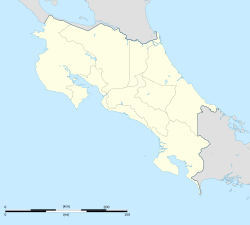Buenos Aires, Costa Rica facts for kids
Quick facts for kids
Buenos Aires
|
|
|---|---|
|
District
|
|
| Country | |
| Province | Puntarenas |
| Canton | Buenos Aires |
| Creation | 26 June 1914 |
| Area | |
| • Total | 555.37 km2 (214.43 sq mi) |
| Elevation | 361 m (1,184 ft) |
| Population
(2011)
|
|
| • Total | 21,063 |
| • Density | 37.9261/km2 (98.228/sq mi) |
| Time zone | UTC−06:00 |
| Postal code |
60301
|
Buenos Aires is a district located in the Puntarenas area of Costa Rica. It is part of the Buenos Aires canton. This district is a place with interesting history and natural beauty.
Contents
A Look at Buenos Aires History
Buenos Aires was officially created on June 26, 1914. This happened because of a special law called Ley 31.
Long ago, the Boruca native people lived here. Later, around 1870, people from Europe started to settle in the area. They began building a road from El Guarco to Boruca. Today, you can still find settlements of different native groups in the district. These include the Bribri, Boruca, and Cabecares peoples.
Exploring Buenos Aires Geography
Buenos Aires covers an area of about 555 square kilometers. It sits at an elevation of 361 meters above sea level.
The district is located between two rivers, the Térraba and El Dique. It is also near the Talamanca mountain range. One cool thing to see here are perfectly round granite rocks. They are a unique natural attraction.
Towns and Villages in Buenos Aires
The main town and administrative center of the district is also called Buenos Aires.
Many other small villages are part of this district. Some of these villages include Alto Alejo, Alto Brisas, Alto Calderón, Ánimas, Bajo Brisas, Bolas, Brujo, Cabagra (parte), Caracol, Ceibo, Colepato, Florida, Guanacaste, Guadalupe, López, Los Altos, Llano Verde, Machomontes, Palmital, Paso Verbá, Piñera, Platanares, Potrero Cerrado, Puente de Salitre, Río Azul, Salitre, San Carlos, San Miguel Este, San Miguel Oeste, San Vicente, Santa Cruz, Santa Eduvigis, Sipar, Ujarrás and Villahermosa.
People of Buenos Aires
| Historical population | |||
|---|---|---|---|
| Census | Pop. | %± | |
| 1883 | 131 | — | |
| 1927 | 1,308 | — | |
| 1950 | 2,034 | 55.5% | |
| 1963 | 4,624 | 127.3% | |
| 1973 | 5,987 | 29.5% | |
| 1984 | 8,295 | 38.6% | |
| 2000 | 16,843 | 103.1% | |
| 2011 | 21,063 | 25.1% | |
|
Instituto Nacional de Estadística y Censos |
|||
According to the 2011 census, Buenos Aires had a population of 21,063 people.
Getting Around Buenos Aires
Road Connections
Several important roads pass through the district. These roads help people travel and connect different areas:
 National Route 2 (This is part of the famous Pan-American Highway)
National Route 2 (This is part of the famous Pan-American Highway) National Route 246
National Route 246 National Route 610
National Route 610
Local Airport
The main town of Buenos Aires also has a small airport. It is called BAI.
What Drives the Economy
The economy in Buenos Aires mostly depends on tourism. Growing pineapples is also a very important part of the local economy.
There are cool eco-tourism activities available. For example, visitors can stay in towns of the native peoples. They can also take classes to learn about organic farming.
Future Plans
There have been ideas to build a large dam on the Térraba River. This dam would help create electricity and form a big lake. However, this project has not started yet. This is partly because of a lack of money. Also, some native groups have expressed concerns about the project.
See also
 In Spanish: Buenos Aires (Costa Rica) para niños
In Spanish: Buenos Aires (Costa Rica) para niños


